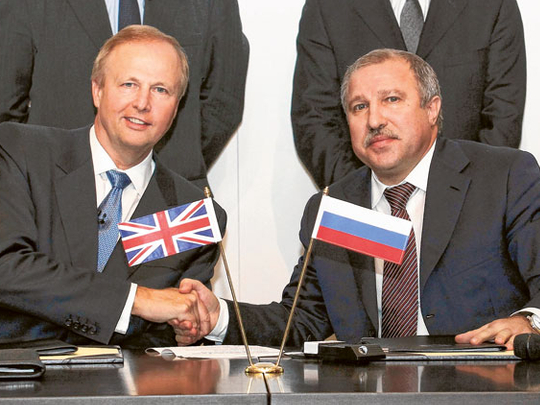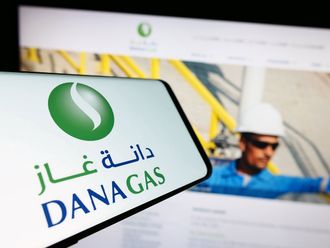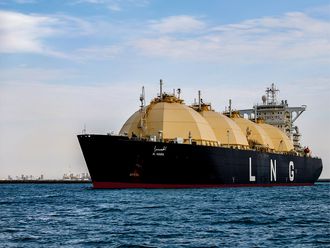
London: In a major deal that cements energy ties between Russia and Britain, oil company BP has announced that Russia's state-owned oil firm Rosneft will take 5 per cent of BP's ordinary voting shares in a major stock swap.
In exchange, Rosneft will give BP about 9.5 per cent of its shares, BP said. Rosneft chairman and Russian deputy prime minister Igor Sechin said Friday the deal was worth about $8 billion (Dh29.42 billion).
The companies plan to explore for oil and gas off the Russian Arctic continental shelf. The announcement sparked a backlash in Washington with some politicians expressing regrets about the tight alliance forming between Russia and Britain.
The agreement follows the disastrous spill off the coast of the US last year. The company has been selling off many of its assets to raise costs to pay for billions of dollars of liability stemming from the spill, the worst environmental disaster in US history.
While it is not clear if this Russian venture is connected, it does give BP access to cash and new areas of the world to explore for oil at a time when there are concerns about the future ability to drill offshore in US waters. It also expands BP's long-standing ties to the Russian energy industry.
Hedging bets
US Representative Edward J. Markey said there should be a thorough review of the agreement to determine if there were any national security implications.
"If this agreement affects the national and economic security of the United States then it should be immediately reviewed by the Committee on Foreign Investment in the United States. Additionally, the US State Department should closely monitor this transaction," Markey said.
US-based analyst Fadel Gheit said the Rosneft deal means BP is "hedging its bets" after the disastrous Gulf oil spill. "They don't want to keep all their eggs in one basket," Gheit said.
He said BP would want to find a replacement for the US if its operations there get more complicated in the future. "The only area where they are welcomed and is open for business is Russia," Gheit said. "Canada, Russia, that's about it."
Gheit said the comments by the US congressman was politics. He didn't expect it to amount to much.
"Sometimes politicians say things that make no sense," Gheit said. "Has Russia declared war on us? Not to my knowledge."
Political fallout
The deal was announced at a new conference in London by leading Russian politicians and oil executives from both companies, including BP chief executive officer Bob Dudley.
Dudley said safety and the environment will be key issues for BP as it enters this venture.
"We have learned many lessons this past year," Dudley told reporters, in an apparent reference to the Gulf of Mexico disaster.
Dudley did not address US interests during his brief prepared comments. He said later that the deal was not a reaction to events in the United States.
"It is difficult to convey just how promising I find this historic agreement," Dudley said. He said it marks "a new type of relationship" which could open up "one of the world's last remaining unexplored basins".
Dudley described the Russian venture as being "based on the promise of the future and not the legacies of the past". Dudley declined to offer specific figures explaining the $8 billion price tag attached to the deal but said it constitutes a huge deal by any measure.
During a question and answer session with reporters, Dudley was asked if the deal was a reaction to the political fallout in the US following the oil spill.
Dudley said BP has been working in Russia for many years and has a large business there. He said the discussions happened over a period of months and were "not in reaction to anything in the United States".
He met earlier in the day in Moscow with Russian Prime Minister Vladimir Putin, an enthusiastic supporter of the stock swap.
Dudley said he intends for BP to be recognised as an industry leader in safety following the "harsh lesson" BP learned following the Gulf disaster.












